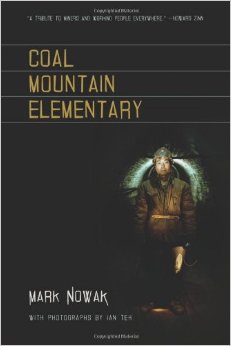
In his latest collection of poems, Coal Mountain Elementary, Mark Nowak invites readers into a conversation on the costs—both human and economic—of coal mining. Despite combining three textual threads within his collection, Nowak’s collection is surprisingly cohesive. Nowak traverses the globe within the pages of this collection, but ultimately unites his poems with one common theme: loss.
“A 40-year-old woman has been waiting in a small room about 50 metres from the mouth of the Sunjiawan colliery since Monday afternoon’s underground explosion,” the first speaker in Nowak’s collection proclaims. “’I have no language for my feelings,’ she said. ‘And there’s no way anybody else can understand it,’” the speaker concludes. Here, however, Nowak does ask his readers to understand—to enter the collection alongside the woman and see the coal mining industry from her, and the other speakers’, points of view.
To solely call the writing in this collection poetry, however, would undermine the value of its real-life origin: because all of Nowak’s poems are verbatim excerpts of mining information or personal accounts of mining accidents, Nowak acts more like an archivist than a poet; he bridges the gap between poetry and creative nonfiction. “2. Explain that / the mining industry / like any other business, / faces challenges / to make itself / profitable,” an excerpt from the second section states. To classify Nowak’s writing as ‘poetry’ would depreciate the value of the factual basis that the writing is derived from; to call it ‘nonfiction’ would remove the lyricism, the painstakingly careful arrangement of text that went into creating this collection. Reading Coal Mountain Elementary, then, is like delving into a new genre altogether: part poem, part essay, each page brings us deeper into the mines Nowak’s speakers discuss—brings us closer to the personal loss suffered by each individual speaker.
Except for the selections Nowak takes from the American Coal Foundation’s lesson plans, there are no line breaks in this collection. Nowak doesn’t rely on breaks or white space to recreate the rhythm and cadence of each speaker’s voice; instead, he relies solely on their words, taken verbatim from testimonial transcripts and news articles. The speaker of a poem in the third poem proclaims: “They just asked where the rest of them were. I said, there is no others. And that was just when everybody just—the whole ye-hah stuff went sour. Yes, they didn’t—no one knew—yeah. That’s when the no survivors and all the survivors, that’s when it—I can’t describe what it was like.” Here, readers are entranced by the speaker’s voice, by the story he is struggling to tell, and the simplicity of Nowak’s formatting only adds to the text; the lack of authorial manipulation implies a commitment by Nowak to devote the whole focus of each page to the voice of the miner, the relative, the rescue worker. By doing so, Nowak employs a minimalistic approach to the line—Coal Mountain Elementary seems to argue that the best approach to the line in verbatim poetry is to have no definitive line, to use prose poetry as a way of preserving the stories of each interviewee with an authenticity in voice that goes beyond anything line breaks could achieve.
Nowak’s authorial absence in this collection is displayed even in his decision to leave each text untitled, and the lack of authorial reflection here is, at first, startling. However, the story Nowak crafts needs no outside voice. In fact, Nowak’s lack of a single collective speaker allows readers to interpret the information he provides on their own, with minimal authorial intervention: Nowak trusts his readers to find meaning within his juxtaposed photos, news articles, and personal accounts. And, in an age where so many writers feel the need to explain their collections, to provide reflection on the meaning each text creates, this distinction is refreshing: Nowak allows the truth to stand on its own. “With no ambulance or medical personnel on the site, it appeared rescuers were not expecting to find anyone alive from Thursday’s accident,” the speaker of a poem in the second section states. “More than 6,000 miners died in workplace accidents last year, according to [Chinese] government statistics. Labour rights groups say the figure could be as high as 20,000,” a different speaker proclaims. Nowak feels no need to reflect on these numbers, to respond to the personal tragedies so often discussed in this collection. And, indeed, the individual and collective loss that makes this collection so emotionally poignant has no need for authorial rumination for, as one speaker states, “what has happened will continue to haunt us for years to come.”
Reviewed by: Kathryn Waring
